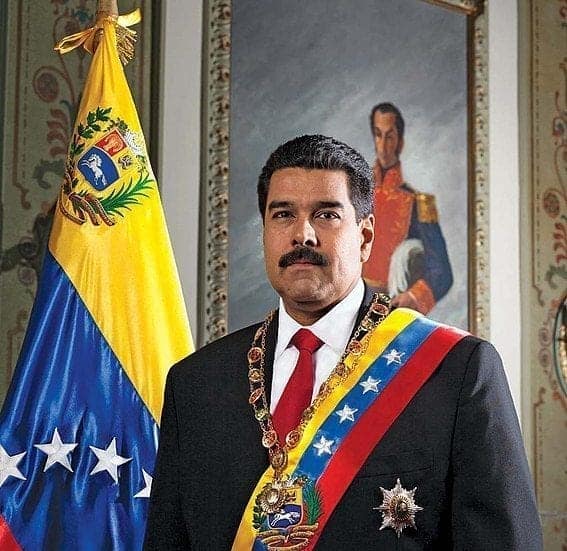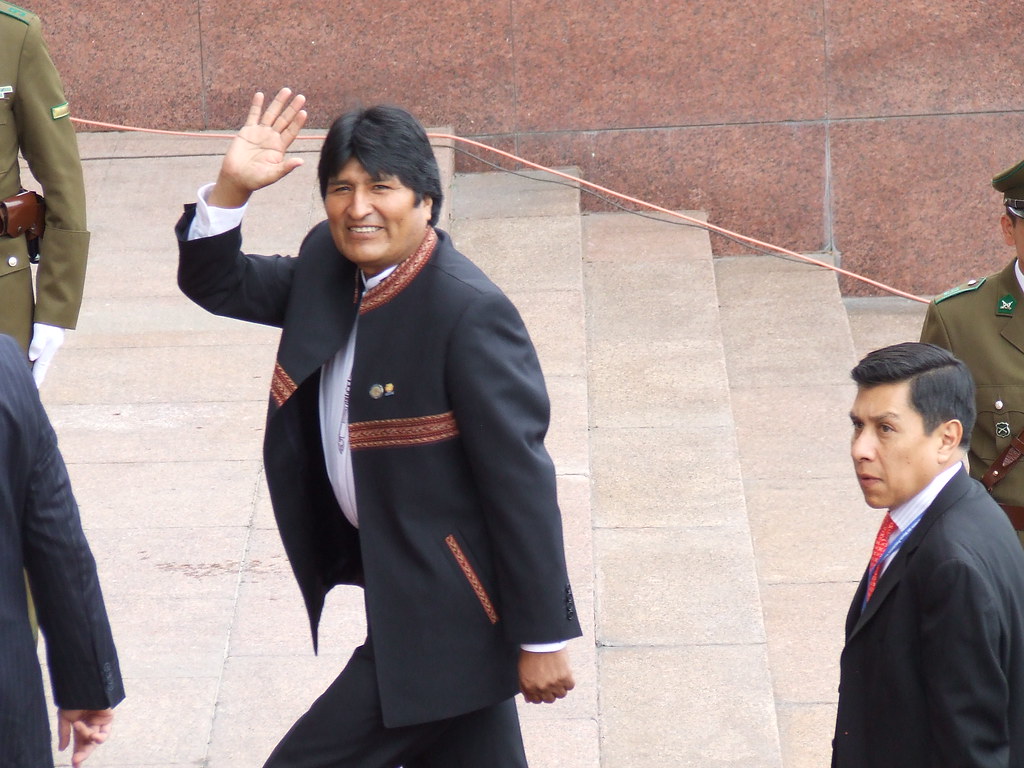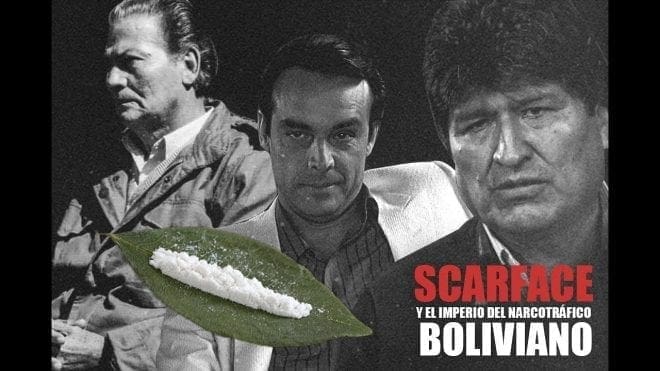Evo’s Bolivian Revolution has been the target of vicious commentaries, slanderous speculations and fake news. The Bolivian white supremacists supported by the political right want to restore the ancient regime and to that end have no scruples.
Part 1/2: Bolivia, Evo Morales and Venezuela
One of the foulest fallacies invented is that since Evo Morales was a trade union leader of the workers that plant and collect Coca leaves in the region of Chapare, and now is the President of Bolivia, the State became a drug dealer state as a result of this foolish equation.
Uses of coca
But the use of the coca leaf is ancestral among the Indians, existed centuries before the Spaniard conquerors came to America. Indians chew the leaf constantly as a habit, like people chew chewing gum in the US. Colonizers and creoles of the New World used the coca leaf to make tea.
Both uses continue to these days in South America. Indians still chew the coca leaf and in Argentina, Southern Brazil, Paraguay, Chile, Bolivia, Peru and Ecuador many drink it as tea. If you visit friends at their homes in Montevideo, Asunción or Buenos Aires you may be offered a tea of coca or a mate “cut with milk” instead of a cup of coffee. Our experience is that it has a pleasant taste. Some say is stimulating but no more than a cup of coffee taken in Caracas or a cup of tea in London.
https://www.youtube.com/watch?v=SJhFtvjlpXk
And like you can find tea bags in supermarkets across the US you also find small bags to make coca tea in the food stores and supermarkets of these countries. There is a market of millions of consumers and a processing industry for drying and packing of the coca leaves.
In the pharmaceutical field there are several applications for the coca leaf, the most known of which is cocaine (Cocaine chlohidrate obtained after a complex process) which of course is an illegal substance . It is considered dangerous for the health of humans and a social menace. All governments of the world prohibit its use and apprehend, prosecute and imprison the dealers of cocaine and other illegal drugs.
Drug dealers, terrorists, leftists
For some authorities there is a gray frontier in the battle against illegal drugs between drug dealers, terrorists and leftist groups that legitimately gain power in a country. The US as a super power exercises hegemony in many parts of the planet and has policies that mix truth and lies on this matter, always according to its geopolitical interests.
If in Colombia the rightist government does not reduce the number of planted fields of Coca they’ll just get a slap on the hand. But if Evo does not accept that the DEA violates its mission of detecting the illegal distraction of the Coca leaves to make cocaine, then the US will support measures to overthrow him.

One of the most infamous counterintelligence fake news is that the Airport of Chimoré was built by Evo’s government for the cocaine drug dealers, implicating with it that Bolivia was a State of drug traffickers. The airport is located in the modest city of Chimoré (population; 21,000), the center of the Tropical region of the Department of Cochabamba that has touristic attractions, landscapes, hotels and national Parks and was inaugurated on the 17th of October 2015.
A fake video
Previously it was a small airport with 1,500 meters landing strip, control tower and minor buildings. It was the principal base of the DEA before President Morales expelled them and decided to build a there bigger airport to move many more passengers to the region and to promote tourism and commerce. The landing strip of the airport now is of 4,000 meters long, an indicative that it also has a strategic military purpose; as a matter of fact it also is a military air base.
But in order to demonize Evo’s prestige a video was edited (we don’t know by whom although we may suppose some agency did) to transmit that Evo built it for drug dealers. To meet this end, they showed the act in which President Morales announces the prompt opening of the airport but when he starts to explain the use of it, he is interrupted and the video moves to show the ample and functional spaces of a modern building to assist passengers and a parking lot for many vehicles, all handsomely looking and neatly designed, with a detail that soon becomes a bulky irregularity and it is that there are no people and no cars using this areas, they are totally empty.
Even more, you may notice there is no furniture in the building. Meanwhile there is a voice insinuating that the airport is for the use of traffickers of cocaine.
Probably the original video was the one shown by the government of the finished or about to be finished civil work but it was reduced with frames on both sides to eliminate from the screen the people that appeared in what was either the inauguration of the airport or people working to take care of last details.
It is needless to say that traders of cocaine use air strips hidden in the jungle, very distant from the public eyes.
Venezuela is not Bolivia
We want to say one more thing before closing this article. There is no way someone can compare the case of Venezuela with Bolivia.
We have explained how Bolivia was an impoverished nation because a white minority prevailed economically, politically and socially over the majority of indigenous people, but this is not the case of Venezuela that till the end of the decade of the eighties had a Gross Internal Product of over US$300.000 million, had a healthy oil industry with an output of 3 million barrels a day of petroleum with five refineries and a big Petrochemical plant. It also had the basic industries of Guyana with factories to produce iron ore, steel, aluminum, bauxite.
An industrial infrastructure that produced automobiles and many manufactured goods. Enough rural production of food to attend a population of 25 million people. The country was crossed all over by highways and well paved roads.

Our problems were of a very corrupt political class that misused and deviated public funds for purposes different than those of public interest when it wasn’t to convey them to their own pockets. The leadership of the parties in power felt no concern with a divided society with a minuscule number that had it all, a few that had some and the immense majority that had none. Inclusion of the least and exclusion of the most.
Venezuela was a very rich country with a distorted, almost null social share of the wealth.
The arrival of Hugo Chavez
This was the picture that welcomed the arrival of Hugo Chavez with a landslide of votes that gave him the victory on 1998.
We are not going now to review the economic policies of Chavez while he was in power. Certainly we have a point of view that results negative, something that started to be evident in the last stages of his tenure. Although, we must say that Chavez had a high sensibility for social problems and social justice and it is a fact that our country was blessed with elevated prices of oil from 2005 to 2011.
Chavez secured a better distribution for all from that wealth. Most of the common people could buy a car, travel abroad for pleasure, overall the middle class. Children and youngsters had access to free education with subsidized breakfast and lunch; the national health system was strong. The more excluded, those in extreme poverty, had guaranteed food.
In March, 2013, Chavez passed away and Maduro took over. But the worst of his followers –with some exceptions- occupied ministries, publics entities, corporations, companies, all boasting loyalty to President Maduro and other cronies of the PSUV but with an enormous anxiety to become rich with schemes of corrupted ways to buy for the State goods that never arrived, contract services that never were done or completed and make unjustified traveling for endless time.
The dictatorship of Maduro
The results were a ruined Oil State Company (PDVSA) with an output that went down to 600 thousand b/d. Paralyzed basic industries, 12,000 factories expropriated and now managed by ignorant politicians, family and friends that have practically no production.
Since the situation is truly difficult for the Venezuelan people there is social unrest with many street protests. There is a very harsh repression and many imprisoned people, civil and military. The balance is that we have is a dictatorship disguised as a democracy and a country in ruins.
Speakers of the Venezuelan Government insist on saying that the cause of all are the economic sanctions imposed by US, only that this punitive actions against the Central Bank of Venezuela and other governmental entities that limit international financial transactions started the last trimester of 2018 and came fully in force during mid 2019 and on.
Regarding Venezuela, US Government has been dictating sanctions of other nature since the days Chavez was in power but they were personal. The subject punished was an identified natural person whose bank accounts in the US were blocked by OFAC.
Returning to Bolivia
Evo Morales was wining the elections with 9% of advantage of the vote when 87% of the suffrage was counted. His rival, Carlos Mesa, recognized that fact. So, where is the second round? OAS, US and other “democratic” countries support de civil coup d’état and valid the nullity of all the electoral process. Something is very rotten and is not in Denmark!
An Attack Against Prevention and Intervention
Patients Beware: Hospitals Seek Donations from Patients
Mexican Food in America by Eric Valenzuela
